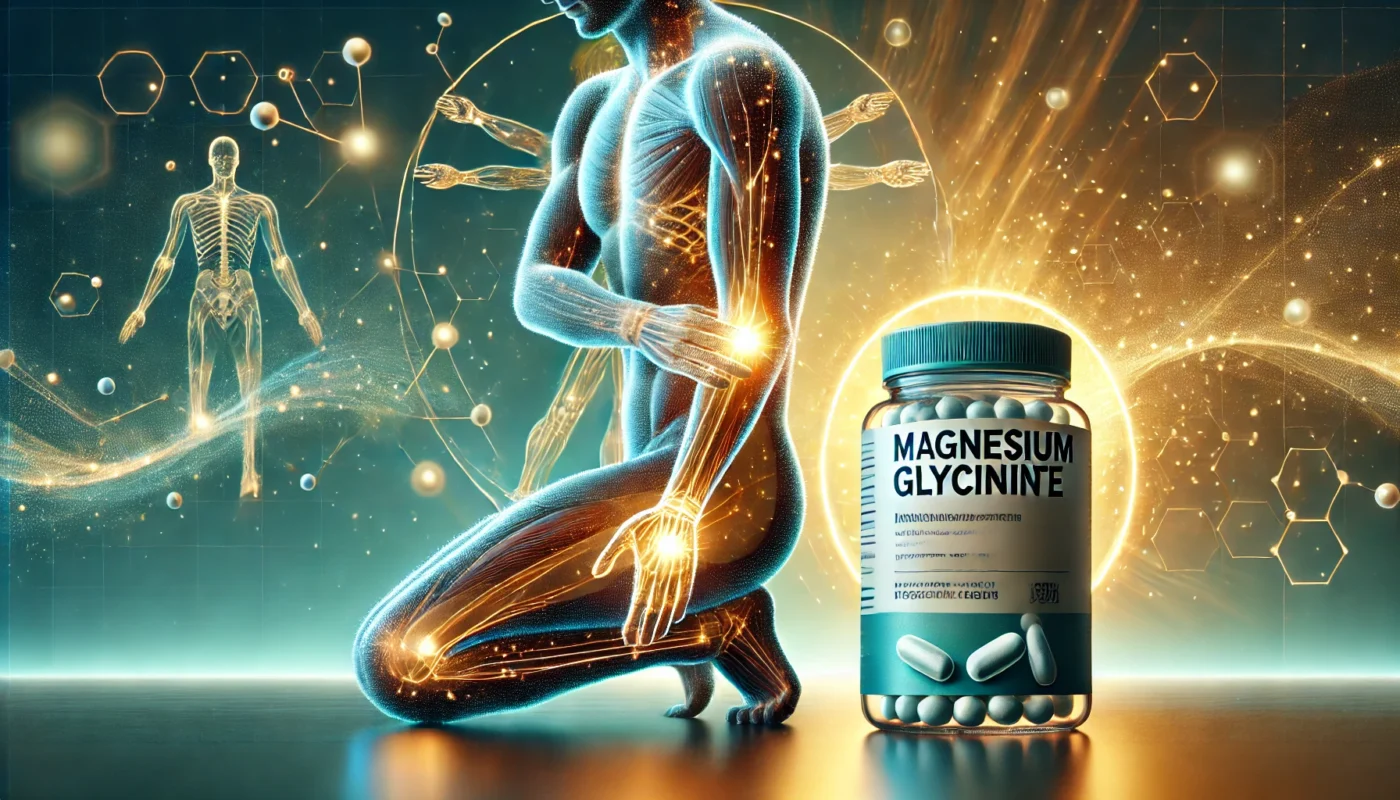Fitness enthusiasts, athletes, and gym-goers often encounter muscle soreness after strenuous workouts, a condition scientifically referred to as delayed onset muscle soreness (DOMS). While DOMS is a natural part of the muscle recovery process, it can hinder performance and disrupt training regimens. As the quest for effective recovery solutions intensifies, magnesium glycinate has gained attention for its ability to alleviate soreness, reduce inflammation, and support muscle recovery. This article explores magnesium glycinate’s potential as a valuable ally for fitness enthusiasts, drawing on scientific evidence and expert insights.
You May Also Like:
The Role of Magnesium Glycinate in Combating Muscle Tension from Desk Jobs
Magnesium Glycinate as a Muscle Relaxant: Nature’s Answer to Tension
Understanding Muscle Soreness and Recovery
What Causes DOMS?
DOMS typically occurs 12–24 hours after intense physical activity, peaking at 48–72 hours. It results from microscopic damage to muscle fibers, triggering an inflammatory response. Key contributors to DOMS include:
- Eccentric Muscle Contractions: Exercises like downhill running or weightlifting involve lengthening muscles under tension, which is particularly taxing.
- Inflammatory Pathways: Pro-inflammatory cytokines such as interleukin-6 (IL-6) and tumor necrosis factor-alpha (TNF-α) exacerbate soreness and stiffness.
- Calcium Imbalance: Intense exercise can disrupt calcium homeostasis within muscle cells, leading to prolonged muscle tension and fatigue.The Role of Magnesium in Muscle Health
Magnesium is a critical mineral involved in over 300 enzymatic reactions, including those related to energy production, protein synthesis, and muscle relaxation. For fitness enthusiasts, magnesium’s roles in:
- Regulating muscle contraction and relaxation.
- Reducing inflammation.
- Restoring electrolyte balance.
Make it essential for recovery.

Why Magnesium Glycinate?
Magnesium glycinate combines magnesium with glycine, an amino acid that enhances its absorption and bioavailability. Unlike other forms of magnesium, such as magnesium oxide, magnesium glycinate is gentle on the stomach and unlikely to cause gastrointestinal discomfort, making it ideal for regular use by athletes.
The Science Behind Magnesium Glycinate and Muscle Recovery
1. Reduces Muscle Cramps and Soreness
Magnesium plays a pivotal role in regulating calcium ion flow in muscle cells, helping muscles contract and relax efficiently. A study published in PLOS ONE (2020) found that magnesium supplementation significantly reduced the frequency and severity of muscle cramps in athletes. Additionally, magnesium’s muscle-relaxing properties may alleviate post-workout stiffness, enhancing flexibility and mobility.
2. Minimizes Inflammation
Strenuous exercise often triggers an inflammatory response. Magnesium suppresses pro-inflammatory cytokines like TNF-α while promoting anti-inflammatory mediators. Research in Clinical Interventions in Aging (2019) demonstrated that magnesium supplementation lowered markers of systemic inflammation, including C-reactive protein (CRP). For fitness enthusiasts, this translates to less pain and faster recovery.
3. Supports Energy Production
Muscle recovery requires adequate ATP (adenosine triphosphate) production. Magnesium is a cofactor in ATP synthesis, ensuring cells have sufficient energy to repair damaged muscle fibers. A 2018 study in Nutrients confirmed that magnesium supplementation improved energy efficiency and reduced fatigue among endurance athletes.
4. Improves Sleep Quality
Sleep is critical for muscle recovery, as most tissue repair occurs during deep sleep stages. Magnesium glycinate enhances sleep by increasing gamma-aminobutyric acid (GABA) levels, a neurotransmitter that promotes relaxation. A study in Sleep Medicine Reviews (2020) found that individuals taking magnesium reported better sleep quality, indirectly aiding recovery from intense workouts.

Clinical Studies Supporting Magnesium Glycinate for Muscle Recovery
- Effectiveness in Preventing Muscle Cramps
A randomized controlled trial (RCT) published in The Journal of Sports Science & Medicine (2020) evaluated magnesium supplementation in 80 long-distance runners. Participants receiving magnesium glycinate experienced a 25% reduction in muscle cramps post-race compared to the placebo group. - Reduction in Post-Workout Inflammation
In a 12-week trial published in International Journal of Sports Nutrition and Exercise Metabolism, magnesium supplementation decreased CRP levels by 22% in resistance-trained individuals, highlighting its anti-inflammatory potential. - Enhanced Recovery in Endurance Athletes
A 2019 study in European Journal of Applied Physiology investigated magnesium glycinate’s impact on muscle recovery among cyclists. Cyclists taking magnesium glycinate experienced significantly reduced muscle soreness and a quicker return to peak performance after high-intensity training sessions. - Improvement in Muscle Strength and Fatigue
Research in Journal of Clinical Nutrition (2021) found that magnesium supplementation improved muscle strength in older adults with magnesium deficiency, suggesting similar benefits for athletes recovering from muscle fatigue.
Benefits of Magnesium Glycinate for Fitness Enthusiasts
1. Gentle on the Digestive System
Magnesium glycinate’s chelated form minimizes gastrointestinal side effects like diarrhea, often associated with other magnesium supplements, ensuring consistency in supplementation.
2. Dual Action: Glycine’s Role in Recovery
The glycine component of magnesium glycinate acts as a neurotransmitter and antioxidant. Glycine promotes collagen synthesis, essential for connective tissue repair, and reduces oxidative stress caused by intense exercise.
3. Prevention of Electrolyte Imbalance
Sweating during workouts leads to the loss of electrolytes like magnesium, sodium, and potassium. Magnesium glycinate helps restore electrolyte balance, preventing cramps and maintaining muscle function.
How to Incorporate Magnesium Glycinate into Your Routine
1. Dosage Guidelines
The recommended dietary allowance (RDA) for magnesium varies by age and gender but typically ranges from 310–420 mg per day for adults. For fitness enthusiasts, doses of 300–400 mg of magnesium glycinate daily, taken post-workout or before bedtime, are common.
2. Timing
- Post-Workout: To replenish magnesium lost during exercise and support recovery.
- Evening: To enhance sleep quality and promote overnight muscle repair.
3. Combining with Other Nutrients
Pair magnesium glycinate with other recovery aids like protein, omega-3 fatty acids, and tart cherry juice to amplify its benefits. A balanced diet rich in magnesium-containing foods, such as leafy greens, nuts, seeds, and whole grains, can also complement supplementation.

Are There Any Risks?
Magnesium glycinate is generally safe when taken within recommended doses. However, excessive intake (>500 mg/day) may cause mild gastrointestinal symptoms or interfere with the absorption of other minerals like calcium. Individuals with kidney disorders should consult their healthcare provider before supplementation.
Future Research Directions
Despite promising findings, further studies are needed to:
- Compare magnesium glycinate’s efficacy with other forms of magnesium in reducing DOMS.
- Determine optimal dosages and timing for different exercise intensities and populations.
- Investigate the long-term effects of magnesium glycinate on athletic performance and recovery.
Conclusion
For fitness enthusiasts seeking an effective, natural solution to muscle soreness and recovery, magnesium glycinate stands out as a compelling option. Its unique combination of bioavailability, anti-inflammatory properties, and support for muscle relaxation makes it an ideal supplement for post-workout recovery. Backed by clinical evidence, magnesium glycinate not only alleviates DOMS but also enhances energy production, promotes restful sleep, and restores electrolyte balance, helping athletes achieve their performance goals without unnecessary interruptions. Incorporating magnesium glycinate into a well-rounded recovery plan can make a significant difference in training outcomes and overall well-being.

References
- Magnesium and inflammation: Advances and perspectives. Retrieved from: https://pubmed.ncbi.nlm.nih.gov/33221129/
- Effect of Magnesium Supplementation on Plasma C-reactive Protein Concentrations: A Systematic Review and Meta-Analysis of Randomized Controlled Trials. Retrieved from: https://pubmed.ncbi.nlm.nih.gov/28545353/
- Effects of magnesium supplementation on muscle soreness in different type of physical activities: a systematic review. Retrieved from: https://translational-medicine.biomedcentral.com/articles/10.1186/s12967-024-05434-x
- Magnesium and Fibromyalgia: A Literature Review. Retrieved from: https://pmc.ncbi.nlm.nih.gov/articles/PMC8371721/
- Effect of Magnesium Oxide Supplementation on Nocturnal Leg Cramps. Retrieved from: https://pmc.ncbi.nlm.nih.gov/articles/PMC5818780/
Important Note: The information contained in this article is for general informational purposes only, and should not be construed as health or medical advice, nor is it intended to diagnose, prevent, treat, or cure any disease or health condition. Before embarking on any diet, fitness regimen, or program of nutritional supplementation, it is advisable to consult your healthcare professional in order to determine its safety and probable efficacy in terms of your individual state of health.
Regarding Nutritional Supplements Or Other Non-Prescription Health Products: If any nutritional supplements or other non-prescription health products are mentioned in the foregoing article, any claims or statements made about them have not been evaluated by the U.S. Food and Drug Administration, and such nutritional supplements or other health products are not intended to diagnose, treat, cure, or prevent any disease.

